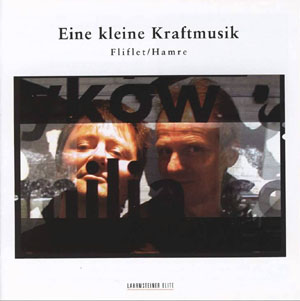 My first reaction to Fliflet and Hamre’s Eine kleine Kraftmusick was to break into laughter from sheer surprise and delight. One forgets, sometimes, how raucously fun-loving Norwegians can be. That is only one point in favor of this collection — one gets a strong sense that the performers take their music very seriously, themselves, not so much so. (And how often does that happen?) They are ably supported in this by Knut Reiersrud, an exceptional guitarist, as well as Harald Dahlst&3248;m, Andreas Fliflet, Olav Tveitane, Häkon Vatle, and Sullekoppene. (The resources employed include not only accordion, drums, piano, guitar, vocals and cittern, but tap dancing and ethnic barking.)
My first reaction to Fliflet and Hamre’s Eine kleine Kraftmusick was to break into laughter from sheer surprise and delight. One forgets, sometimes, how raucously fun-loving Norwegians can be. That is only one point in favor of this collection — one gets a strong sense that the performers take their music very seriously, themselves, not so much so. (And how often does that happen?) They are ably supported in this by Knut Reiersrud, an exceptional guitarist, as well as Harald Dahlst&3248;m, Andreas Fliflet, Olav Tveitane, Häkon Vatle, and Sullekoppene. (The resources employed include not only accordion, drums, piano, guitar, vocals and cittern, but tap dancing and ethnic barking.)
In some ways, this is a very frustrating CD to write about — description is next to impossible, musicianship is extraordinary, and the mix, while firmly based in Norwegian traditions, roams all over the globe (a hora from Romania, a Macedonian ballad, and the “Relativity Tango,” subtitled “Ein stein hit og Einstein dit,” and I wish I knew enough Norwegian to translate that — itself based on the Yiddish dance song “Die Goldene Chasene“, with a little bit of Buenos Aires for good measure).
By way of example, the aforementioned hora, “Hora de la Bergen,” becomes an incredibly rich mélange of styles and sounds over a swinging rhythm that just doesn’t quit — followed immediately by Reiersrud’s bluesy treatment of “Bavno oro,” the Macedonian ballad, employing not only steel guitar, but a water-filled bedpan. (Gabriel Fliflet’s vocals, incidentally, call to mind the barest hint of the peculiar vocal quality of Icelandic rímur, as well as a bit of the flavor of the Middle East, and somehow sound quintessentially Norwegian.) “Udsigter fra Ulrikken” was developed from Bergen’s anthem, with the infusion of rhythms and themes from the southern Balkans and the younger girls of Sullekoppene on vocals for the rollicking finale. “Ven kan segla,” which immediately follows, is a sweet, somewhat melancholy love song from Sweden, beautifully performed — it’s not all hijinks. And “Parlen“, from an old Swedish hymn, in which Fliflet is accompanied by Hamre on the hamrophone — an instrument made up of a series of kitchen pans. Don’t laugh — it’s absolutely hypnotic.
Every track is a highlight, and this is after four or five listenings.
Enough — if you have any taste for Scandinavian music at all, or world music, or for simple joie de vivre for that matter, go out and get this album. I’m still grinning.
(Lahrmsteiner Elite, 2004)
